After at last seeing off local rivals, Notts County, next up, 40 years ago, for the tricky trees was Cloughie's first club, and old stomping ground (whatever that is!), Middlesbrough. Forest were oozing confidence, having just dispatched the oldest enemy in football in midweek, our neighbouring jinx team Notts County, and were unbeaten in nine games, sitting two points clear at the top of the first division. Middlesbrough, were in 13th place having won, drawn and lost 4 of their 12 games.
The big story here has to be the relationship of Forest's management team with 'Boro. Brian Clough was not only born in Middlesbrough but they were his first club where he had an amazing scoring record 204 goals in 222 games. Clough met and became friends with his management partner Peter Taylor at Middlesbrough too. Taylor played in goal. More on that later, but first I'm going to take my regular look into the history of our opponents and see how they compare with Forest.
As I said, everyone has heard of Cloughie. Just a few months ago, I bumped into a Sunderland fan at Perth Soccer Club who was keen to tell me all about him as I'd never even seen a few seconds of film footage of the man playing.
He waxed lyrical about how he was a classic target man and could shield the ball from even the biggest center backs. He described how once, a ball had been played to him hard from midfield at waist height. With a big center half breathing down his neck, Clough elegantly volleyed the ball, with one touch, to his left winger who he knew was in space. Then, Clough spun around the defender leaving him dead as the winger took a couple of steps with the ball before crossing straight onto Brian's head where he, inevitably, put it in the back of the net.
The Mackem (Geordie slang for Sunderland fans) also told me how he'd been there, at Roker Park, on Boxing Day 1962 to watch them play Bury and how he saw Cloughie collide with the Bury goalkeeper and never get up. The end of a great career, at his peak at 27 years and 9 months.
I've always wondered how Clough could think (let alone say) that when his friend was in goal for the same team. Maybe I'll find the answer in their autobiographies, which I admit I have not yet read but am currently doing so.
The big story here has to be the relationship of Forest's management team with 'Boro. Brian Clough was not only born in Middlesbrough but they were his first club where he had an amazing scoring record 204 goals in 222 games. Clough met and became friends with his management partner Peter Taylor at Middlesbrough too. Taylor played in goal. More on that later, but first I'm going to take my regular look into the history of our opponents and see how they compare with Forest.
 |
| Brian at Boro |
History of the 10th Oldest League Club: Middlesbrough
Middlesbrough are one of the oldest (10th or 11th depending on your opinion on Stoke City's origins) league clubs. They were formed in 1876, eleven years after us, and joined the football league's Second Division in 1899-1900, eight years after Forest. As seems to be the case with most teams in the league, Forest's early start didn't help them for long and it only took 'Boro six seasons to overtake them in the league, a status they would maintain for decades. Boro finished higher in the league every season bar three from 1904-05 until 1954-55, peaking twice in 1938-39 and 1950-51, when they finished 38 places above us. From 1955-56, though, Forest enjoyed a 17 year period of dominence, peaking in 1966-67 when Forest finished Runners-Up to Manchester United whilst Boro had their one and only season in the third tier, 34 places below us.
So, Forest's league record against Boro was, as usual, a bit embarrassing. We'd finished above them 25 times, they finished above us 43 times. Middlesborugh's average league place was almost 6 above ours.
Sadly, and it does grieve me to write this, like Notts County, despite such a long history, Middlesbrough's trophy cabinet was remarkably bare on the day they came to Nottingham at the end of October 1977. What had Boro, ever won? Well, discounting the Second Division title, which they've won three times, and the Anglo-Scottish Cup... nowt. They've won the League Cup and done well in Europe since then, of course and I'll cover those in a future blog. But here I'm looking back in the past.
Middlesborugh's best ever season in the league was in 1913-14, when they finished 3rd in the First Division.
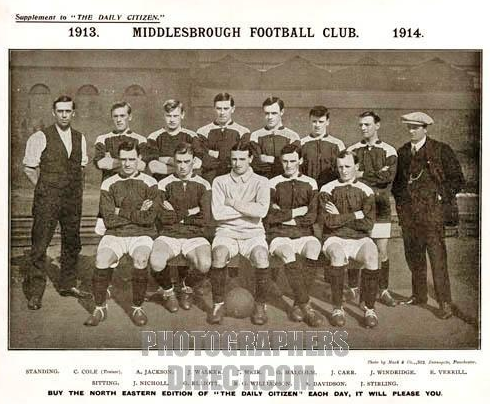 |
| Middlesbough's best ever team? According to league position |
 |
| 'Boro's best season in the league ever |
But Boro's best three year spell was between 1936 and 1939 when they were the 4th best team in England. This was the era of Wilf Mannion, one of the greatest legends to come from the club. He was the most capped Middlesbrough player (26 England caps) and played 341 times scoring just one short of 100 goals.
 |
| Wilf Mannion - The original "Golden Boy"? |
 |
| With Mannion, Boro were the 4th best side in England, 1936-1939 |
It's amazing to remember how star players like Mannion had their careers effected by the war. Not only was Mannion's career shortened by it, he actually fought in France and Italy, too. After the war, he wanted to leave Middlesbrough but the club refused. In the days before freedom of contract, Mannion was stuck. After protesting by refusing to play, he eventually did come round and continued scoring goals.
Mannion finally left 'Boro in 1954, ending an 18 year relationship and got into trouble with the Football League, who suspended him over some articles he'd written, presumably complaining about players' freedom. Almost 30 years after playing his last game for them, Middlesbrough awarded him a testimonial to reward him for his services to the club - that has to be some kind of record.
With Mannion gone, 'Boro got relegated to Division Two, where they would spend the next 12 years. But before looking at that next phase in Boro's history, here's some words written about Wilf Mannion by someone who not only saw him, and who's father adored him, but was actually got changed with him in the same dressing room.
There were times when I got changed in the same dressing room as Wilf and I couldn’t help but stare at him in his training kit in the mornings. He was skinnier than I was and yet there was no more meat on me than on a ninepenny rabbit. He was smaller than me – apparently he was only five feet five – but to see him out there on the football field in training, and particularly in a match, I felt as if I was watching somebody who lived on the moon. I knew where I was from and at that time I couldn’t recognise that a young lad from Valley Road was of the same species as the footballer I saw doing things with a ball that I’d never thought possible. If he’d not been on the pitch he could have been on the top of a Christmas tree, or a birthday cake. He seemed that delicate and yet managed to dominate the surroundings totally. His hair, a glossy silken blond the colour of Father Christmas’s wig, earned him the nickname ‘Golden Boy’. He looked too fragile to cope with the physical competition of football but appearances can be deceptive. Wilf Mannion could cope with anything the game threw at him. He played football the way Fred Astaire danced. He glided through every movement, every routine. He swept past centre-halves and full-backs without touching them and if they tried to kick him – no point, too late, he’d gone like a will-o’-the-wisp.
Clough, Brian. Cloughie: Walking on Water (Kindle Locations 494-504). Headline. Kindle Edition.
The words, of course, of Brian Clough, another Middlesbrough hero, that came into their side pretty much as Mannion left it.
 |
| Cloughie's Autobiography |
Brian Clough - Goal Scoring Machine
Everyone has heard of Brian Clough, the manager. But it frustrated the hell out of him that he never got the recognition he deserved as a player. When you see his scoring record it's just incredible.
See that? 251 goals in 274 games. At Middlesbrough his goals/per game rate was 92.5%. Now, one could argue that his whole club career was played in the second division, but it is sad that in his 9 years playing up in the North East, no first division club snapped him up so that he could test his talents at the top level. He only won two England caps, another big frustration of "Old Big 'Ed"!
He waxed lyrical about how he was a classic target man and could shield the ball from even the biggest center backs. He described how once, a ball had been played to him hard from midfield at waist height. With a big center half breathing down his neck, Clough elegantly volleyed the ball, with one touch, to his left winger who he knew was in space. Then, Clough spun around the defender leaving him dead as the winger took a couple of steps with the ball before crossing straight onto Brian's head where he, inevitably, put it in the back of the net.
The Mackem (Geordie slang for Sunderland fans) also told me how he'd been there, at Roker Park, on Boxing Day 1962 to watch them play Bury and how he saw Cloughie collide with the Bury goalkeeper and never get up. The end of a great career, at his peak at 27 years and 9 months.
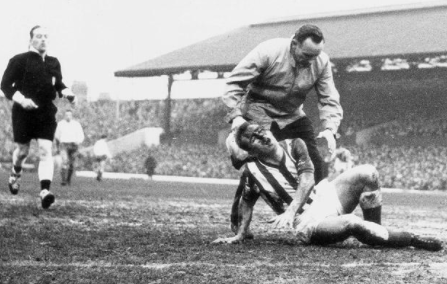 |
| Sad end of Cloughie's playing career, Boxing Day, 1962 |
The way his career ended obviously made Clough very bitter and it was this fire in his belly that probably drove him onto such great things as a manager.
But let's not forget someone else of key importance of that project here: Peter Taylor. Born in Nottingham but who also played for Middlesbrough at the same time Cloughie did.
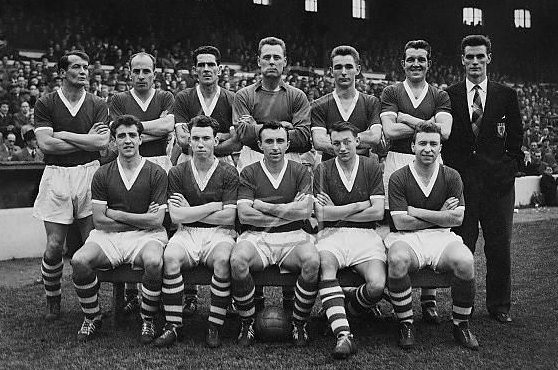 |
| Middlesbrough 1957-58 - Notice Peter Taylor and Brian Clough stood together on the back row |
Peter Taylor was in goal for Boro at a time when they were leaking goals for fun. Boro's defence was so dodgy it led Clough to suspect that some of the defenders were accepting bribes.
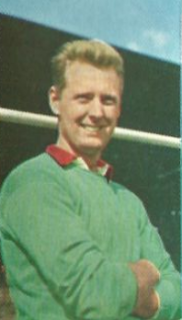 |
| Peter Taylor |
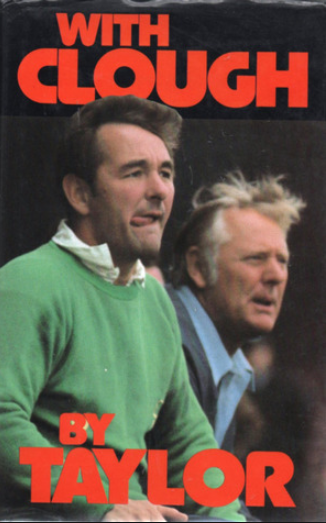 |
| Peter Taylor - Never given enough credit so must read his book too |
In the 1960s, Boro went on a bit of a decline and were relegated from the second tier into the Third Division for their first and only time. They won immediate promotion, behind the rampant QPR side I described last week.
Jack Charlton takes Boro Up
Another famous name associated with Middlesbrough is Jack Charlton. In his very first managerial appointment after a long playing career with Leeds United (and only Leeds United) and England, he took the side up back up to the First Division in the 1973-74 season, after a 19 year absence. And he did it in style. They won it by 15 clear points (in the days of two points for a win) conceding just 30 goals, one 6th of which were conceded at the City Ground against Forest. (Including a rocket from the most unlikely scorer, left back John Winfield.)
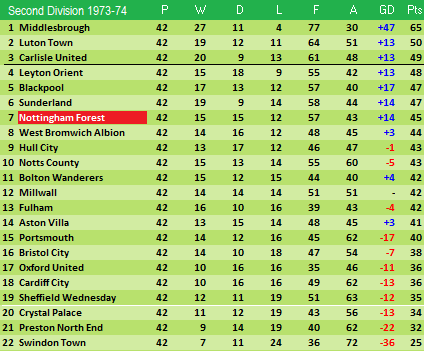 |
| Boro storm back into the First Division - but get hammered at Forest 5-1 |
 |
| Middlesbrough, Back in the First Division under Jack Charlton |
You may notice, sat next to Jack in that photo is center half, Stuart Boam. He was one of the first players I admired whilst playing for Mansfield Town. Boam was a Kirkby lad so we all had a particular affinity for him and watched his career develop at Middlebrough where he would make 322 appearances.
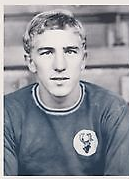 |
| Stuart Boam - a Kirkby Lad |
Under Jack Charlton, 'Boro were a force to be reckoned with and finished 7th in the first season back. In the two seasons before this match, though, they had slipped back into a lowly mid table position but at least had their first taste of silverware, the Anglo-Scottish Cup following a 1-0 win (over two legs) v Fulham.
So, although Boro hadn't really won any major silverware (apart from the Anglo-Scottish Cup, of course) , they had performed better than Forest in the league over the years and were ahead on the clashes between the clubs. Forest had played Boro 39 times in first class matches and Boro were well ahead 18-10 on wins, with 11 draws.
 |
| Another Club that had beaten Forest over the years |
Forest's best win against Boro was in the 1973-74 season when, Boro were sailing onto an easy Second Division Championship win under Jack Charlton. What they hadn't reckoned with though, of course, was Duncan McKenzie - playing the form of his life. Middlesbrough's biggest win against Forest was 6-2 in 1947 in the F.A. Cup. I presume Wilf Mannion was among the goals that day.
Generally, the games seem to have been higher scoring than average - at 3.2 goals per game. Only two 0-0 draws and seven 1-0 in all those 39 games.
Ok, so we're getting ready for the match itself now. But for a change I have something different to offer here. I want to introduce my good mate from Nottingham University, Andrew Smales, better known amongst us as... you've guessed it... "Boro", for obvious reasons. He's kindly agreed to chip in here with his own take on the match and supporting football in general.
Opposition View
Forest
40 Years Ago – An Opposition Perspective
Forty years ago today, my dream football
match turned into a nightmare…
As a Middlesbrough supporter studying at
the University of Nottingham, it always seemed to me that it would be really
cool to just stroll along the banks of the Trent to watch my team in action,
then strut back afterwards to bask in the glow of a victory.
In 1976, during my first year, it had
seemed a hopeless dream, as Forest struggled to join Boro among the elite. Then
unexpectedly Forest snatched a promotion place, and I was among a small band of
Forest fans who witnessed the decisive match at Bolton that sent them up. As
the celebrations got underway on the coach home, I looked forward to seeing my
dream match the following season, with no reason to suspect the horrors to
come.
Algis very kindly invited me to provide an
opposition viewpoint to sit within his excellent blog describing all the events
of 40 years ago. I note below my recollections of the game itself (they are
mercifully sketchy) but for anybody interested, I would also like to give a bit
of a bigger picture.
Feel free to skip straight to the
nightmare… (I would add some spooky Halloween symbols here, but I hate that
shit)
A
brief history of Boro and me
Early Days
I went to my first Boro match in 1964 at
the age of 6 and then sporadically for the next couple of years without ever
feeling more than mildly interested in watching the games. In April 1966
however, I went to a game with some significance attached to it. With Boro
struggling at the foot of Division 2, my Dad took me to see Boro v Bury – a relegation
‘4-pointer’ – telling me that if we won the game we would definitely stay up. A
scrappy 1-0 was duly achieved and all was well. Except that less than a month
later we lost 5-3 at Cardiff in our last game of the season and were condemned
to the drop.
The fact of relegation barely registered,
to be honest, but I was absolutely stunned that my Dad had got something wrong.
Needless to say, in the 50 years since then he has never once allowed himself
to be even slightly optimistic about Boro’s prospects. Which makes him a
typical Boro fan.
A season in Division 3
The following season, as I started going to
most home games, was eventually a successful one. Starting sluggishly and still
in the bottom half at Christmas, we put together a terrific winning run which
culminated in promotion being sealed with a win in the last game of the season.
That final match (a 4-1 win over Oxford) is still the stuff of legend on
Teesside, though I missed it as it was a school night.
Six Seasons of Frustration
We spend the next 6 seasons in Division 2,
always challenging towards the top without ever really coming close to going
up. My first ever away game provided a real ‘sliding doors’ moment, as we
travelled to the Baseball Ground on Boxing Day 1968 to take on Brian Clough’s
Derby. We were the top 2 teams in the division, with Derby leading by a single point.
Although the Rams scored first, Boro hit
back and led 2-1 by half time. We were still leading well into the 2nd
half when a completely unnecessary handball gifted the home side a penalty to
equalise and, deflated, we went on to concede another.
From that point on, Derby eased their way
to promotion and within 3 years had won the First Division title. Meanwhile
Boro continued to bang their heads against the promotion ceiling.
Charlton’s Champions
In 1973/74 we finally cracked it – and how!
With World Cup winner Jack Charlton taking on his first managerial appointment,
a team that had been among the best in the division for years suddenly shot
clear of the pack. Promotion was sealed in March with 8 games still to play,
and the title was won a week later. The final margin was a record 15 points, in
the days of 2 points for a win. (On a Nottingham Forest blog, it’s only fair to
point out that one of the four games we lost that season was an astonishing 5-1
defeat at the City Ground. Fortunately I missed that game!)
So up we went to Division One, with high
hopes that this team could go a lot further.
A season of “What-Ifs”
The story behind this blog, of Nottingham
Forest going from obscurity to be champions of Europe, is undoubtedly an extraordinary
one. It won’t ever be repeated. But in 1974/75 my team had a genuine
opportunity to do something similar. Arguably we could have won all 3 major trophies
had things gone just slightly differently. Really!
In the league we finished 7th,
but only 5 points behind the champions (Derby again). We had beaten the Rams
comfortably at the Baseball Ground in the autumn, and when we played them at
home in April we were just above them in the table with only 5 games to play.
Leading 1-0, a defensive slip allowed Francis Lee to steal a late equaliser –
Jack Charlton afterwards describing it as the moment we lost the league. We
actually went on to lose further games against two sides (Wolves &
Leicester) in the lower reaches of the league and the final table had us well
adrift.
In the cups it was equally frustrating, as
we reached the last 8 of each. In the League Cup, we failed to put away what
was then 2nd Division Man Utd and lost in a replay at Old Trafford.
The pain made greater by the fact that the semi-finals were actually contested
by 3 teams from Division 2 (Man U, Villa & Norwich) and 1 from Division 4
(Chester!) – so it was there for the taking. In the FA Cup we went out at
Birmingham, a team we had beaten 3-0 both home and away in the league. Charlton
made the mistake of playing for a replay, and we were undone by a set piece in
the 2nd half. Again, the pain made worse by the fact that 2nd
Division Fulham would have been the semi-final opponents, while the eventual
winners were West Ham who had finished well below us in the league.
We never came as close again, although we
remained competitive in the top flight – and we were actually top of the table
in October 1976 when I started my time at Nottingham University. But that
season fizzled out and I became increasingly interested in what was happening
in my new home town, as I willed Forest to promotion.
Back
to the Forest Blog
Cheering for Forest
I didn’t actually go to that many Forest
games during their promotion season, as I continued to follow Boro whenever I
could, but I was always aware of how the promotion chase was panning out and
watching out for results.
And I was present at possibly the most
significant game that season – Bolton v Wolves on May 14, when Bolton’s defeat
allowed Forest to take 3rd spot. I had heard on the radio that some
Forest fans had organised a coach to go to the game, and I managed to flag them
down as they passed me on their way out of the city centre. The game was
watched in a surreal atmosphere, as the local police didn’t really know what to
do with a bunch of Forest fans – and the guys I was with spent the match
baiting fans of both teams (despite celebrating the Wolves goal). At the end of
the match there was a frightening 3-way battle among the fans on the pitch,
before we all got back to the coach and opened the beers.
Although I felt a bit of an impostor among
the Forest fans, I was nevertheless delighted to see them promoted and looked
forward eagerly to seeing Boro play there the following season.
The Nightmare Unfolds
The 1977/78 season had started in typically
mixed fashion for Boro. We were considered an established First Division club
after 3 seasons in the top flight, and like most other teams we had started the
season with aspirations of competing for the title (back then, no team would
ever view simply avoiding relegation as an objective for the season).
The opening day had seen a decent draw
against the reigning European Champions as Kenny Dalglish scored on debut for
the visitors, but after that there was nothing to get too excited about. As
Forest launched themselves towards the top of the table in the first few weeks,
Boro muddled along in mid-table. But we had 3 wins and a draw in the games leading
up to the fixture at the City Ground, so I was still fairly confident that we
would put the upstarts in their place.
I went to the game with 2 other Boro fans
that I vaguely knew at the University. In retrospect that was the first sign of
a bad day ahead. One of the guys was a real die-hard Boro fan, always ready to
join in the chants, bait the opposition, and talk about where the ‘aggro’ might
break out. The other guy was at the ‘softer’ end of the supporting spectrum, he
was from Boro but didn’t really go to many games and was actually an
increasingly frequent spectator at Forest games. My instinct was to side with Die
Hard, but Softie lived in the same hall of residence as me so I couldn’t really
disown him. We ended up watching the game without speaking to each other.
I had been to Forest games before, and
every ground had something of a menacing atmosphere in those days, but even so
I was a bit surprised at how edgy it felt making our way into the away
enclosure. Didn’t these snarling Forest fans know that I had cheered for their
team just a few months before?
90 Minutes of Torture
To the game itself, and here thankfully the
veil comes down. I never saw any tv highlights of the match (as far as I know
none exist) and I made a point of not reading any reports. That, together with
normal mental coping mechanisms, mean that I honestly remember almost nothing
of the game. There are fragments in my mind suggesting that we might have
actually started ok before the goals started going in. There is a vague recollection
that our goalkeeper was badly at fault for either the 2nd or 3rd
goal before we had even got to half time. And I remember Viv Anderson curling
one over the keeper from in front of our enclosure to make it 4-0 in the second
half. I think.
I have no other clear memories until the
inevitable squabbling between my 2 companions at full time. Die Hard wanted us
to stay with the main group of Boro fans going to the railway station (“safety
in numbers, bound to be lots of aggro!”), then wait a while until the coast was
clear. Softie just wanted to follow his normal route back with all the Forest
fans, and maybe do a bit of shopping on the way. I went with Softie, knowing
that Die Hard would never talk to me again.
What Happened Next
I went straight back to my room and stayed
there all night, trying to process what I had experienced. It equalled the
worst defeat I had ever witnessed as a Boro fan, in score-line at least.
Psychologically, I told myself, it was not quite as bad as the time I watched
Boro lose a derby by the same score at Roker Park, against a rampant Sunderland
side that won the FA Cup two months later. But deep down, what really hurt was
that I had wished this monster into being – I had wanted Forest in the same
division as Boro so I could puff my chest out as we beat them. Now they were
better than us and I couldn’t put the genie back in the bottle. Damn!
In the coming months as the nightmare of
Forest’s title win came to pass, I raged and argued and bet with people that
they would fail. Softie confirmed my worst fears by switching his allegiance
almost completely to Forest and referring to them as ‘us’, which at least
allowed me to have a go at him.
But I was back in the saddle within two
weeks of the debacle – hitch-hiking to Birmingham to see Boro win 1-0 at Villa.
On my way back I happened to get a lift from Gordan Cowans’ father, who spent
the 30-minute journey ranting about how Boro’s “thugs” had kicked his boy (only
17 at the time) off the park. I hid my scarf a bit further under my jumper and
smiled inside – wasn’t it great to be a Boro fan?...
Andrew Smales
October 2017
The Game
Another largely unchanged team for Forest but it looked like Clough and Taylor were struggling to juggle their midfield playerts since Archie Gemmil had arrived. Making way this time, and for the first time, was Martin O'Neill. Bizarrely, Martin came on late for - you'd never guess - Larry lloyd.
Jack Charlton had moved on in the close season - something he said he'd always regretted. The new manager was John Neal. In the Boro side was the nasty but impressive Graeme Souness, in his last season for Boro before going on to better things at Liverpool. Terry Cooper, the ex-Leeds left back was injured so John Craggs returned at right back with Ian Bailey switching to the left.
Nottingham Forest
1 Peter Shilton, 2 Viv Anderson, 3 Colin Barrett, 4 John McGovern, 5 Larry Lloyd, 6 Kenny Burns, 7 Archie Gemill, 8 Ian Bowyer, 9 Peter Withe, 10 Tony Woodcock, 11 John Robertson.
Goals: Viv Anderson 2, John McGovern 1, Ian Bowyer 1.
Substitutions: Martin O'Neill (12) came on for Larry Lloyd(5).
Middlesbrough
1 Jim Platt, 2 John Craggs, 3 Ian Bailey, 4 Graeme Souness, 5 Stuart Boam, 6 Alan Ramage, 7 John Mahoney, 8 David Mills, 9 Billy Ashcroft, 10 Tony McAndrew, 11 Dave Armstrong.
Substitutions: John Hickton(12) came on for Billy Ashcroft (9).
Attendance: 27,373.
The Game
Now my memory is about 1% as good as Boro's (Andrew Smales, remember) so what I write here is not from memory but from John Shipley's book again. I must say I'm quite chuffed, and amazed, that Boro seems to have got at least one or two minor details about the sequence of goals wrong. I wouldn't have remembered anything at all. I can't even remember where I stood for this game - but probably in the Trent End.
Viv Anderson improbably scored two and Bowyer headed in a third before half time and John McGovern got the fourth when Jim Platt let a fierce shot through his hands into the net.
Viv Anderson improbably scored two and Bowyer headed in a third before half time and John McGovern got the fourth when Jim Platt let a fierce shot through his hands into the net.
Other Results That Day
Other results went very well for Forest that day with the two closest rivals, Liverpool and West Brom, both losing. Manchester City beat Liverpool 3-1 to move back into 4th place. Everton and Newcastle fought out an eight-goal thrilling draw at Goodison and Coventry City moved into the chasing pack in 6th place with a 3-1 win at Wolves. Mick Ferguson got a hat trick bringing him level him with Peter Withe at the top of the First Division scorers table.
 |
| First Division Top Scorers |
So Forest were now four points clear at the top. Amazing.
Middlesbrough had slipped to 15th place.
Middlesbrough had slipped to 15th place.
 |
| Four Points Clear at the end of October 1977 |
The Match Day Programme
Post 18







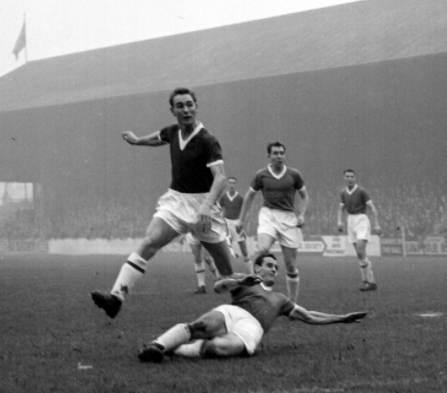
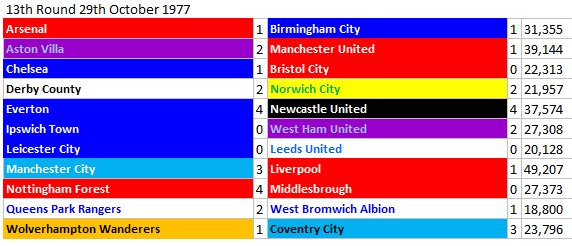
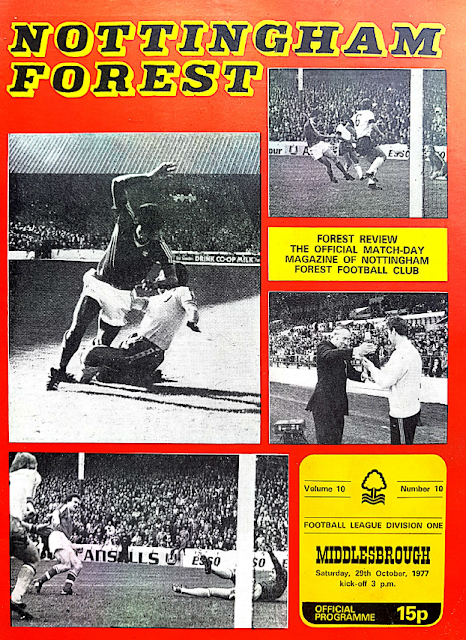


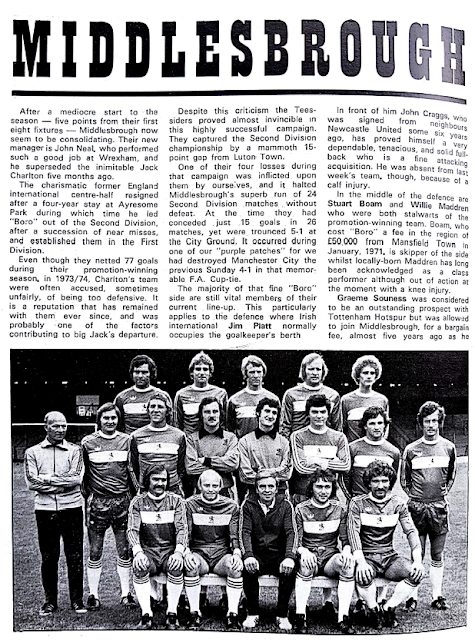
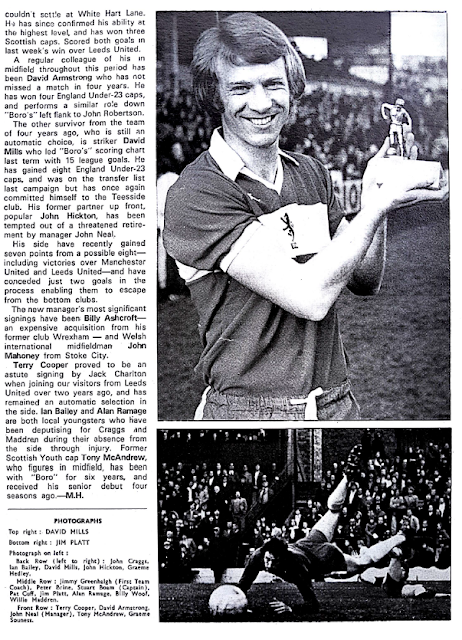
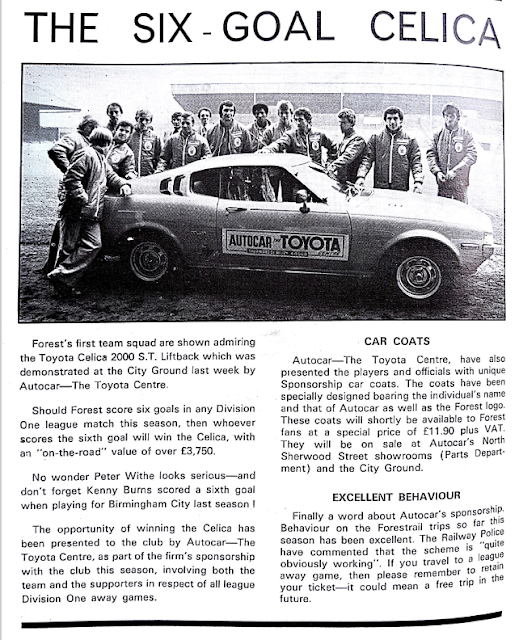





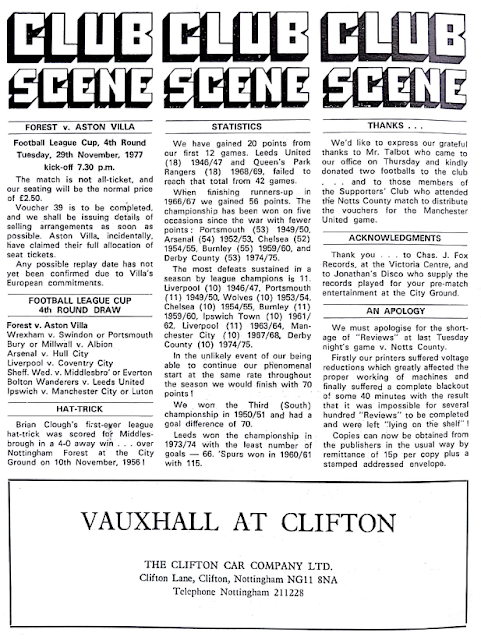
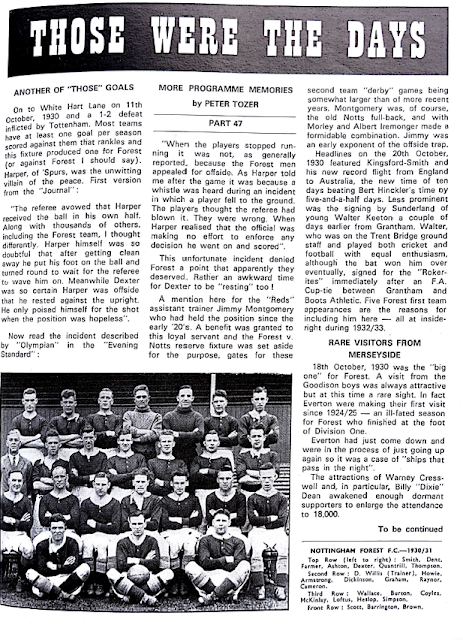



Comments
Post a Comment